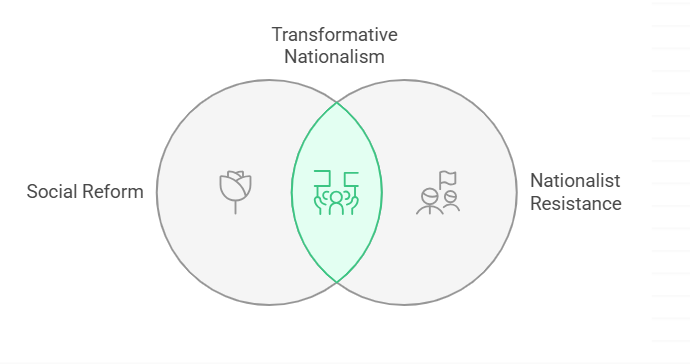-
17 Jun 2025
GS Paper 1
History
Day 2: "The nationalist movement and socio-religious reform were not isolated trajectories but mutually reinforcing developments."Discuss the statement with reference to the contributions of the Arya Samaj and the Self-Respect Movement. (250 words)
Approach :
- Begin by explaining that the Indian nationalist movement was not merely political—it was deeply social and cultural.
- Discuss how nationalism and social reform were interlinked trajectories.
- Use the contributions of Arya Samaj and the Self-Respect Movement to support the argument.
- Conclude with their relevance and legacy.
Introduction:
The Indian freedom struggle was not merely a political movement against British colonialism but also a profound social and cultural reawakening. These movements not only challenged regressive practices but also empowered marginalized sections, making them active participants in the nationalist discourse.
Body
Nationalism and social reform were interlinked trajectories
- Colonial rule exploited not only India’s economy but also reinforced social hierarchies, religious orthodoxy, and divisions.
- Nationalist leaders recognized that internal social evils like untouchability, caste discrimination, gender inequality, and superstition weakened collective resistance.
- Thus, reform and resistance became complementary: reform created a moral and social awakening, while nationalism provided political expression to that awakening.
Role of Arya Samaj in Reinforcing Nationalism
- Founded by Swami Dayanand Saraswati in 1875, Arya Samaj advocated a return to the pure values of the Vedas.
- Promoted social reforms such as:
- Opposition to caste discrimination, child marriage, and idol worship.
- Promotion of women’s education, widow remarriage, and inter-caste marriage.
- Contributions to Nationalism:
- The Shuddhi Movement (re-conversion of Hindus) was seen as a way to protect Indian identity from colonial missionary influence.
- Emphasized Swadeshi and national education, aligning with the Swadeshi Movement.
- Influenced nationalist leaders like Lala Lajpat Rai, who described Arya Samaj as “a university of patriotism."
Role of the Self-Respect Movement in Reinforcing Nationalism
- Founded by E.V. Ramasamy (Periyar) in 1925 in Tamil Nadu, the movement focused on rationalism and social equality.
- Demanded self-respect and dignity for the non-Brahmin and oppressed castes, challenging religious and social orthodoxy.
- Contributions to Nationalism:
- Though critical of the Congress’s upper-caste dominance, it instilled a spirit of resistance and dignity in the Dravidian identity.
- Promoted gender equality, inter-caste marriages, and atheism, thus fostering liberation of the mind, which is crucial for political freedom.
- Inspired Dravidian political movements and non-Brahmin mobilization, creating inclusive democratic participation in the nationalist struggle.
Conclusion:
Although distinct in ideology and geography, both the Arya Samaj and the Self-Respect Movement made significant contributions to creating a socially conscious and politically mobilized India. As historian Bipin Chandra aptly observed, “The social reform movements created the ideological and cultural groundwork for the rise of modern Indian nationalism.”





